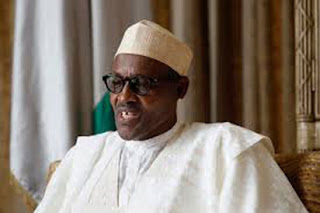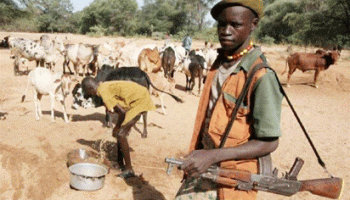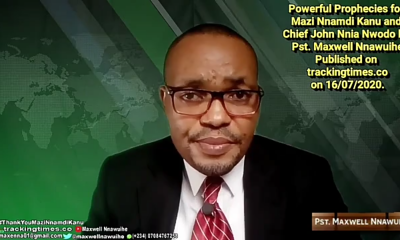Business
Insecurity: Nigerian Orgasmic and Accidental Security Measures
Tracking Times Banner
Orgasmic and accidental security measures doesn’t last and that’s what best describes the Nigerian State.
Nigeria is seen in the eye of her citizens and the rest of the world as grossly incapable of protecting her citizens as a country.
Time and time again, the Nigerian security architecture breaks-down before minor or major security challenges, from the Hinterland to the Waterways, from the Airports to the International Borders etc.
Boko Haram appears untethered, Fulani Herdsmen now seems immuned from arrest or prosecution, implacable and more deadly than Boko Haram.
Worst of it is the orgasmic and accidental security measures of the Nigerian Govt. and its Security Operatives, after countless lives of hapless and unarmed citizens have been wasted in consistent, repeated and planned attacks.
After the perpetrators have had a filled day that’s when Nigerian Govt. and its Security Operatives reacts.
According to Vanguard, the Federal Government, yesterday, ordered immediate deployment of troops to Benue, Taraba, Nasarawa, Kogi, Niger and Kaduna states to contain insecurity in the six states.
The deployment came following ceaseless clashes between farmers and herdsmen which have resulted in several deaths and destruction of property worth several billions of Naira.
Meanwhile, peeved by the state of insecurity in the country, the House of Representatives, yesterday, asked President Muhmmadu Buhari to sack the Inspector-General of Police, Ibrahim Idris, and replace him with ‘a more professional officer’.
This came on a day the Senate threw out the report of the Committee on Police Affairs, National Security and Intelligence over recent killings in Benue State, and scolded the committee for writing and presenting what it described as unbalanced and incomplete report.
Deployment of troops
The Chief of Army Staff, Lt. General Tukur Buratai, who announced the development at a press conference, yesterday in Abuja, said the troops will carry out special operations in the affected states in conjunction with other sister security agencies, including the Nigerian Police, Nigerian Security and Civil Defence Corps among others.
Army Chief of Training and Operations, Major General David Ahmadu, who briefed the media on behalf of Buratai on the planned conduct of the special Army operations, tagged: ”Exercise Ayem Akpatuma”, said the exercise had become more “expedient due to upsurge in cases of armed banditry, kidnapping and cattle rustling in Kaduna and Niger states as well as other sundry crimes in Kogi State and herdsmen/farmers clashes and attacks on innocent members of our communities, particularly in Benue, Taraba and Nasarawa states by armed militias.”
According to him, the special operations will be conducted in 1 and 3 Divisions, including Headquarters, Guards Brigade, and 707 Brigade; Areas of Responsibility, covering Benue, Taraba, Kogi, Nasarawa, Kaduna and Niger states from Thursday, February 15 to Saturday, March 31, 2018.
He said: “You may recall that last year, the Nigerian Army conducted several training activities for its personnel in different geopolitical zones of the country, in line with its constitutional role in aid of civil authority.
“More so, Exercise Ayem Akpatuma has become more expedient due to upsurge in cases of armed banditry, kidnapping and cattle rustling in Kaduna and Niger states as well as other sundry crimes in Kogi State and herdsmen/farmers clashes and attacks on innocent members of our communities particularly in Benue, Taraba and Nasarawa States by armed militias.
“These security challenges have continued unabated in these states, despite the efforts by sister security agencies to curb them.
Exercise Ayem Akpatuma
“This exercise will be conducted in conjunction with other security agencies such as Department of State Services, the Nigeria Police and Nigeria Security and Civil Defence Corps.
“It will also afford the troops an opportunity to effectively checkmate the dreadful activities of the marauding criminal militias perpetrating criminal acts in these states and environs.“
Major-General Ahmadu also said Exercise Ayem Akpatuma was conceptualized to dovetail into real-time operations, thereby fulfilling both training and operations objectives of sharpening operational skills of personnel as well as providing an avenue to conduct operations against violent criminals when called upon.
“Exercise Ayem Akpatuma will also be unique as the ones before it, with the establishment of Step-Up Brigade Headquarters in Benue, Taraba, Kogi, Nasarawa, Kaduna and Niger states. Emphasis will be placed on raids, cordon-and-search operations, anti-kidnapping drills, road blocks, check-points and show of force, as well as humanitarian activities such as medical outreach.
“It is pertinent to note that Exercise Ayem Akpatuma is set to be another remarkable exercise that would make the nation proud of the Nigerian Army’s determination to sustain its constitutional role of defending the territorial integrity of the nation as well as its commitment to aid the civil authority to bring about peace and security in troubled areas.
“In this regard, members of the public, especially residents of Benue, Taraba, Kogi, Nasarawa, Kaduna and Niger states are enjoined not to panic as the security, safety and well-being of innocent and law abiding citizens have been deliberately factored in the planning of this exercise.
“In order to ensure cordial civil-military relations, we shall make contact phone numbers of all Brigade Commanders public in addition to the Nigerian Army short code Information and Call Centre 193.”
Sack IGP — Reps
Lawmakers in the House of Representatives, after listening to two separate motions by Mark Gbillah and Nuhu Damburam from Benue and Kano on the state of insecurity in their respective states and the alleged lackadaisical attitude of the IGP, did not hesitate to pass a vote of no confidence on the Police boss.
This development was sequel to an amendment to a prayer in Nuhu Damburam of Kano’s motion under matters of public importance on the need to stop thuggery in Kano State.
John Dyegh (APC, Benue), had moved that his prayer be amended to reflect that the IGP should be replaced by a more professional police officer.
The Speaker at this point, said “if we amend, it all means we have passed a vote of no confidence” and the response was a thunderous yes!
Before the amendment move by John Dyegh, most of the lawmakers, who spoke on the state of thuggery in Kano, had appealed for peace to reign in Kano.
Damburam, leading the debate, had argued that “thuggery in recent times in Kano has really impeded law and order in the state as Police and other security operatives turn blind eyes to what is happening around them.
“This development is dangerous to democracy and it’s worrisome that a ranking lawmaker is at the top of such a situation.”
In his contribution, Kolawole Gabriel (PDP, Ondo), said “thuggery can only be curtailed if the youths are gainfully employed and unfortunately if you are not in the ruling party, you are prone to attack.”
The ayes have it
Ali Madaki (APC, Kano), in his view, pointed accusing fingers at the IGP, saying ”he is the cause of lawlessness across the state as he seems to be aiding them.”
House Whip, Alhassan Ado Doguwa, however, spoke against the position of his colleagues, claiming that ”without any fear of contradiction, your position on this matter was mischievous, misleading and misinforming the House.’’
He was greeted by a thunderous No! No! by his colleagues, who equally warned that his choice of words were not honourable.
Kingsley Chinda (PDP, Rivers), citing Order 9, Rule 7 of the House, demanded that the Whip should withdraw such words “as they were unparliamentary.
But Doguwa continued, insisting that he would not change his choice of words.
The presiding officer, Yakubu Dogara, after listening to all the submissions, put it to a voice vote and the ayes carried the day.
Earlier, Mark Gbillah under matter of National Importance, entitled: “Motion on The Derogatory Statement By the Police PRO Against An Executive Governor of a state and the seeming unwillingness of the IGP to recognize and enforce a constitutionally enacted law by the legislative arm of Government”, had an overwhelming support.
After close to an hour debate on the issue, the House resolved that the constituted House committee on the recent killings and insecurity should further investigate the IGP’s utterances, outside apologising to Governor Ortom.
The lawmakers also asked for the immediate removal of the Force PRO.
Pally Iriase (APC, Edo); Hassan Saleh (APC, Benue); Kingsley Chinda and others contributed meaningfully to the debate.
Benue Reps on Police PRO
In a related development, the Benue State caucus in the House of Representatives, yesterday, warned the IGP to steer clear of politics and restrict himself to the role of maintaining law and order.
Spokesman of the Caucus, John Dyegh said: “Jimoh Moshood’s tirade against the governor is hate speech and, therefore, a criminal act.
“We condemn and reject the calls for the resignation of Governor Samuel Ortom by the Nigeria Police, as openly canvassed by Jimoh on a national television.
“Governor Ortom has done excellently well to protect the lives and property of all residents of Benue State within the limits of his powers and the provisions of the Constitution of the Federal Republic of Nigeria.
“We therefore, stand with Ortom and support the full implementation of the anti-grazing law as the only panacea to resolving the perennial herdsmen attacks on our farmers and communities and a peaceful co-existence of all residents/inhabitants of Benue State.
Senate throws out committee report
Meanwhile, the Senate, yesterday threw out the report of its Committee on Police Affairs and National Security and Intelligence over recent killings in Benue State, saying it was unbalanced and incomplete.
According to the Senate, the report failed to unfold the failings of the Nigeria Police in curbing the killings in Benue and many other states.
Consequently, the Upper Chamber asked the committee to do a more balanced and objective report for Senate’s consideration.
It asked the committee, headed by Senator Abu Ibrahim (APC, Katsina South), to take testimonies from the governor of Benue State, Samuel Ortom, who was massively indicted by the report and report back in one week.
It was particularly not happy that the committee members failed to reach out to the governor to get his own views, even after the panel had met with the Inspector-General of Police, Ibrahim Idris, who spoke against Ortom.
Soon after Senator Ibrahim presented the six-page report where he highlighted the ‘achievements’ so far recorded by the Police IGP, than other senators took him up, describing the report as biased, unbalanced and incomplete.
His colleagues came down hard on him when Senator Ibrahim asked the senators to commend the IGP for his efforts after the Benue crisis.
What was submitted to the Senate was based mainly on the testimony of Ibrahim Idris, just as the report blamed the recent disturbance in Benue on the Anti-Open Grazing Bill passed by the state.
Business
As Nigerians Battle Pains Of Soaring Petrol Price
This is more than just about fuel; it’s about the larger picture of governance failure. The fact that a country as oil-rich as Nigeria can’t provide affordable fuel for its people is a tragedy.
BY IFEANYI MOGBOLU
The Daily Times-The latest fuel price hike in Nigeria is beyond frustrating. Every time we think it can’t get worse, it does, and yet again, ordinary Nigerians bear the brunt of it.
It’s like a never-ending cycle, where the government’s promises of reforms or stabilisation always end up as empty rhetoric. The cost of living is already sky-high, and now, with fuel prices rising again, transport fares, food prices, and basic commodities are bound to follow suit.
It’s enraging because it doesn’t feel like anyone is truly considering the everyday citizen who is struggling just to survive.
This is more than just about fuel; it’s about the larger picture of governance failure. The fact that a country as oil-rich as Nigeria can’t provide affordable fuel for its people is a tragedy. The subsidies are gone, and now we’re left in a situation where the prices of everything keep climbing, while salaries remain stagnant or non-existent for many.
The disparity between the elites and the masses is growing, and it feels like nobody in power truly cares about the suffering of the people.
READ ALSO: NNPC Lied About Pump Price, Our Fuel Is 15% Cheaper Than NNPCL’s Imported Ones — Dangote
Hardship: ‘Suspend All Policies Impoverishing Nigerians’, NASME Begs Tinubu
Naira Hits Six-month Low In Official FX Market, Prof. Steve Hanke Slams Tinubu
The anger isn’t just about fuel; it’s about the entire state of living. Nigerians are exhausted. There’s no sense of security; power supply is erratic, basic infrastructure is crumbling, and inflation is at an all-time high. How do we live like this? Every day is a battle to make ends meet, and the government seems utterly disconnected from the struggles on the ground.
It’s infuriating that while politicians and elites live in luxury, the rest of us are left scrambling for the bare minimum. The state of living is unbearable, and the lack of empathy or real action from those in power only adds salt to the wound.
There’s a deep sense of anger and betrayal that comes with seeing your country’s wealth mismanaged, while the people continue to suffer. It’s hard not to feel like we are constantly being taken for granted, pushed further into hardship without any hope of relief. Something has to give, because this state of affairs is unsustainable.
QUOTE:
The anger isn’t just about fuel; it’s about the entire state of living. Nigerians are exhausted. There’s no sense of security; power supply is erratic, basic infrastructure is crumbling, and inflation is at an all-time high. How do we live like this? Every day is a battle to make ends meet, and the government seems utterly disconnected from the struggles on the ground. It’s infuriating that while politicians and elites live in luxury, the rest of us are left scrambling for the bare minimum.
Business
Nigeria To Receive $5.600,000 From Bill Gates, For Health And Agricultural Reforms, GMOs
Alongside the activities surrounding the 79th United Nations General Assembly in New York, Vice President Kashim Shettima held a meeting with the Bill and Melinda Gates Foundation leading to the announcement of the donation by the Foundation’s head of Global Development.
Bill and Melinda Gates Foundation is giving Nigeria through Vice President Kashim Shettima, a $5.600,000 funds to speedy up health and agricultural reforms in favour of the GMOs in Nigeria, and flood relief.
Through the Foundation’s head of Global Development Programme, Dr Christopher Elias, Bill Gates pledged $5 million grant approved for Lagos Business School and partners to develop the agricultural economics they called “industrial cassava” and $600,000 for flood relief in Borno State and other health sector initiatives.
Alongside the activities surrounding the 79th United Nations General Assembly in New York, Vice President Kashim Shettima held a meeting with the Bill and Melinda Gates Foundation leading to the announcement of the donation by the Foundation’s head of Global Development.
Recall that on 4 September, Bill Gates had described the Nigeria’s economy as “stagnated” and proposed agricultural reforms for faster and increased growths in crops, fruits, vegetables amongst others to enhance nutritional values of the Nigerian citizens through the agricultural sector.
In that meeting Chaired by Vice President Kashim Shettima, Bill gates urged Nigeria to adopt “innovative crop varieties with shorter growing periods, higher yields, and better pest resistance” pointing to the GMOs to address the food crisis.
READ ALSO: Bill Gates, Anthony Fauci and conspiracy theories (part 2)
Nigeria’s economy stagnated – Bill Gates
Nigeria Is Not Meant To Exist, A Collateral Damage And British Royal Niger Corporation -Burna Boy
Moreover, at the 79th UN General Assembly in New York, VP Shettima reaffirmed to the Bill and Melinda Gates Foundation, the commitment of the administration of President Bola Ahmed Tinubu prioritizing health, nutrition, and agricultural development in Nigeria’s national agenda.
In a statement by Senior Special Assistant to the President on Media and Communications, Office of the Vice President, Stanley Nkwocha, Shettima said: “we are deeply committed to addressing the pressing developmental challenges facing our nation, particularly the significant malnutrition crisis”.
He emphasised the Federal Government’s dedication and urgently working to secure locations for maize production under the Telemaze programme.
VP Shettima, promising swift action to the Gate’s Foundation on import permits for certified seeds, the VP said, “We recognize the critical importance of food security and industrial agricultural development. The Cassava Accelerator programme, in particular, holds immense potential for our economy.
“We are pursuing a whole-of-government approach to digitisation and data exchange systems, which we believe will revolutionise our public services,” he added while reiterating the government’s focus and commitment to digital transformation.
“With the expertise” of Nigeria’s ministers, “and the continued support of partners like the Gates Foundation,” the nation remains confident in its “ability to drive meaningful change and improve the lives of all Nigerians.”
In his response, President of the Global Development Programme at the Gates Foundation, Dr. Christopher Elias, said the Foundation is burdened with worries of the severe flooding in Borno, and is “committed to supporting Nigeria in times of crisis.”
Speaking of Polio, the Foundation said, “We’re impressed by the national task force’s efforts to eliminate variant polioviruses by year-end,” Dr. Elias noted.
Also, President of Global Growth & Opportunity Division at the Bill & Melinda Gates Foundation, Rodger Voorhies, detailed plans for scaling up drought-tolerant maize production and advancing the Nigeria Cassava Investment Accelerator programme emphasizing that a $5 million grant has been approved for Lagos Business School and partners to develop the agricultural economics of industrial cassava.
In his words, “Industrial cassava presents a multi-billion-dollar opportunity for Nigeria,” Voorhees stressed.
He requested import permits for 5,000 metric tons of certified GMO maize seed to build a foundation seed system in Nigeria.
Business
Managing, Leading, Building Institutions And Sustainability
The two primary tasks of a top-level leader are to exploit and explore the organisation with people for now and in the future.
By Babs Olugbemi
One of my concerns for leaders is their capacity to be ambidextrous. Regardless of years of experience, knowledge, and leadership capacity, the lack of a clear distinction between managing and leading on the one hand, leading and building institutions on the second layer, and ultimately focussing on sustainability is a significant threat to successful leadership change.
I have followed events and people at C-suites, coached some, and developed frameworks for leadership development. Based on the personalities and styles of the new leaders, I have confirmed my fears about leadership sustainability in most African organisations.
“Successful leaders can aptly differentiate themselves and their roles without necessarily seeing activities as performance, focussing on what is required of them with appropriate tenacity and influence.”
The challenge for leaders is how to lead for the present and future without losing sight of the stakeholders’ immediate performance expectations. Successful leaders can aptly differentiate themselves and their roles without necessarily seeing activities as performance, focussing on what is required of them with appropriate tenacity and influence.
READ ALSO: Leadership, not God responsible for Africa’s poverty
Afrocentric colonialism: The new face of African oppression
Health: Genotype And Compatibility, Phenotype, Blood Groups And DNA
In my walk as a leadership coach, I have keenly observed leaders who are managing rather than leading. Managing involves ensuring that processes achieve their intended outcomes. Leaders are above managing and should focus on creating an enabling environment for innovation, inventions, and team collaboration. The primary role in leading is not to monitor process outcomes, though critical to the company’s overall objectives, but to align corporate values with the people’s aspirations to create an engaged and ownership-thinking mindset ready to take on challenges and explore opportunities. An alignment of corporate and personal goals will not only deliver the present performance expectations. Still, it will also incubate innovations to adapt to future market demands and the sustainability of the business.
Unfortunately, the capacity for ambidexterity is rare and often marked by leaders’ exposure, approach and styles, perception, and perspective of their roles in the organisation. A leader with a wrong foundation in these areas is set for failure and awaits unfavourable decisions from the board of directors. A top-level leader might manage their teams instead of leading them. Not all leaders can combine leading for the present with building institutions. However, anyone able to submit themselves to an institution-building mechanism can champion sustainability. Aside from being a leadership coach, I help leaders achieve sustainability.
Mathematically, creating an ambidextrous organisation is beyond leading. It is to lead and build an institution that focuses on sustainability in all aspects of the organisation—employee fulfilment, customer retention, strategy effectiveness, performance evaluation, stakeholder management, process improvement, and goal congruence.
In a nutshell, the role of successful leaders in ambidextrous organisations is striking a balance between exploiting current assets and capabilities to ensure short-term success and allocating enough energy and resources to exploration to ensure future viability. The two primary tasks of a top-level leader are to exploit and explore the organisation with people for now and in the future. The two seemingly contradictory aspects—exploitation and exploration—encompass different strategies and processes and have different targets and outcomes (March 1991; O’Reilly & Tushman, 2004; O’Reilly & Tushman, 2013).
O’Reilly and Tushman described the two concepts as follows:
- Exploiting: Exploiting involves building on an organisation’s achievements and maximising returns on previous investments. It focuses on responding to current business demands to remain efficient and competitive within an established market niche, as well as on maintaining an existing customer base and stakeholder relationships. Examples of exploiting are activities focused on continuous improvement, benchmarking, and redesigning business processes.
- Exploring: Exploring focuses on expanding an organisation’s knowledge and capabilities, pioneering new products and services, and discovering and venturing into untapped markets.
The common area of practical bottlenecks in exploiting and exploring in organisations is a need for foundational trust and cohesion among the resources, especially the human capital, which are often treated as costs rather than assets to the organisations. Among all the factors of production, only humans can be ambidextrous with the capacity to think about changes in economic parameters and adjust their behaviours to match the time, content, and contextual requirements.
While organisations might have the resources to deploy in fighting competition, technology to obtain first-mover advantages, and production capacity to maximise output from input, none is compared with the potential of an engaged workforce.
Therefore, for leaders to be successful, they must refrain from operating in the realm of managing. They should operate in the capacity of institution builders, with the mindset of creating sustainable leadership and growth with people first and other factors of production second.
Consequently, only the leaders who prioritise their people over profits, pride, and organisational arrogance will be successful in the long term.
-

 News5 years ago
News5 years ago$800m oil fraud: resign as Petroleum Minister – Frank tells Buhari, asks for probe
-

 Biafra5 years ago
Biafra5 years agoPROPHECY: Powerful Prophecies for Mazi Nnamdi Kanu and Chief John Nnia Nwodo by Pst. Maxwell Nnawuihe (Text & Video)
-

 Biafra5 years ago
Biafra5 years agoBREAKING: Dragon Flag Can’t Come Down, You Must Allow Our Brave Men To Do Their Job – Nnamdi Kanu
-

 Business8 years ago
Business8 years agoNEWS PAPER HEADLINES FOR TODAY THURSDAY 28 SEPT 2017
-

 Business4 years ago
Business4 years agoFUEL: PPPRA removes new petrol price post as NNPC insists no hike
-

 Business7 years ago
Business7 years agoSuspected Fulani militia kill two in fresh Taraba attacks
-

 Biafra5 years ago
Biafra5 years agoVIDEO: Powerful Prophecies for Mazi Nnamdi Kanu and Chief John Nnia Nwodo by Pastor Maxwell Nnawuihe
-

 News6 years ago
News6 years agoA fatal accident along Benin/Auchi express way has claimed the lives of an entire family while traveling for Christmas.
lucky
February 11, 2018 at 7:53 am
God forbid the seven years of suffering in a strange land. We have our eyes now open… But what do we now do under this siege condition we have been reduced to,,, can someone answer me pls?